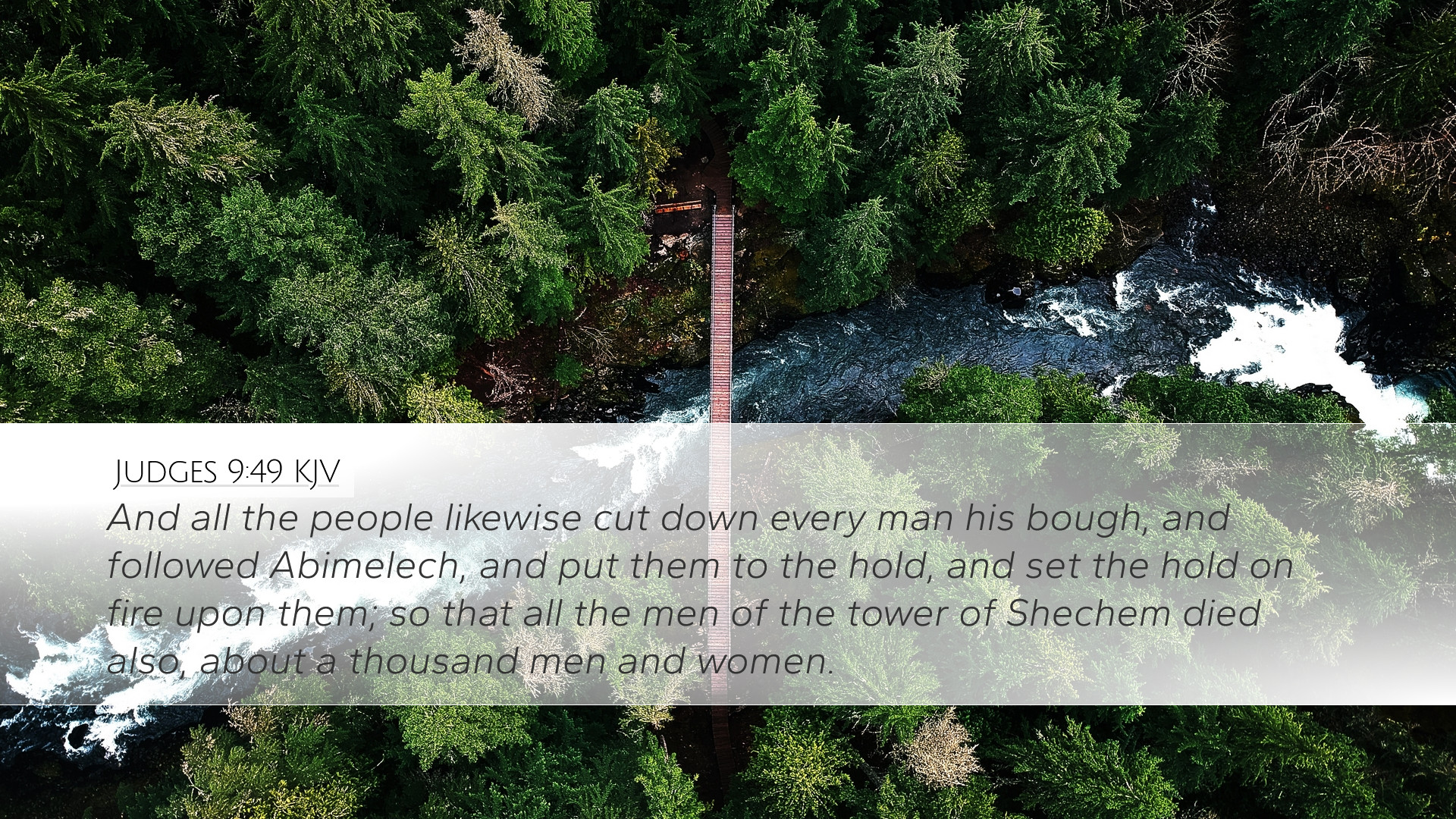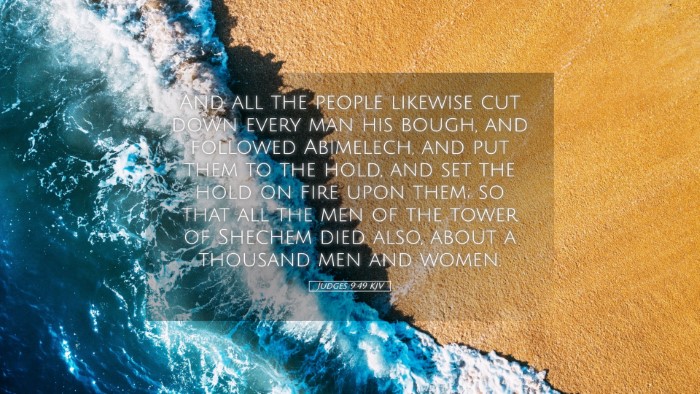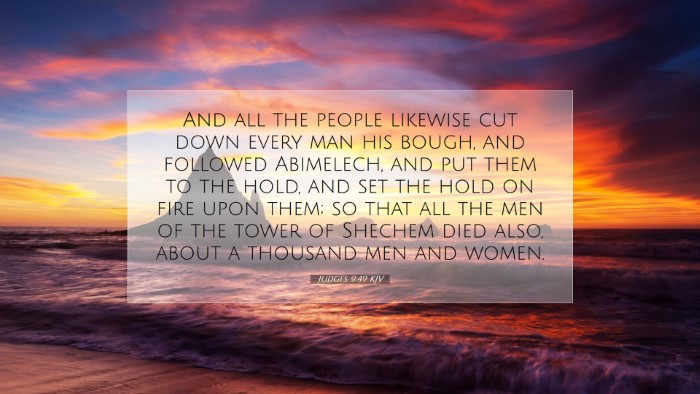Commentary on Judges 9:49
Judges 9:49 presents a critical moment in the narrative of Abimelech and reflects the tumultuous period of the judges in Israel. This commentary draws from esteemed public domain sources, synthesizing insights that bear significance for pastors, students, theologians, and Bible scholars.
Text of Judges 9:49
"And they cut down every one his bough, and followed Abimelech, and put them to the hold, and set the hold on fire upon them; so that all the men of the hold of Shechem died also, about a thousand men and women."
Contextual Background
To understand Judges 9:49, it is crucial to examine the events leading up to this verse. Following the death of Gideon, Israel experienced a period of instability, with various factions vying for power. Abimelech, Gideon's son, sought to establish his kingdom through treachery, and this verse encapsulates the culmination of his violent actions against the city of Shechem.
Understanding the Setting
Shechem was a significant city in ancient Israel, often associated with covenantal moments and spiritual significance. However, in this instance, it became a site of rebellion against divine authority, showcasing the dire consequences of disobedience and the human propensity towards tyranny.
Commentary Insights
Matthew Henry's Perspective
Matthew Henry, in his well-regarded commentary, emphasizes the destructive nature of Abimelech’s ambition. He points out that the action taken by the citizens of Shechem—cutting down branches to follow Abimelech—symbolizes their complicity in his wicked plans. It illustrates how personal ambition can ignite collective folly.
- Symbolism of the Boughs: The branches represent the people’s choices; their cutting down signifies their abandonment of righteous paths. Henry notes the gravity of choosing to support tyranny.
- The Hold and Its Destruction: The stronghold signifies a refuge that became a site of devastation. Henry warns against seeking safety in alliances with wickedness, as it leads to inevitable destruction.
Albert Barnes' Contribution
Albert Barnes highlights the decisiveness of Abimelech. He notes that the act of fire symbolizes divine judgment and wrath. The burning of the stronghold signifies God’s condemnation of both Abimelech and the Shechemites.
- Destruction of Innocence: Barnes remarks that the deaths of “about a thousand men and women” underscores not only the tragic consequences of civil conflict but also the loss of lives caught in the web of ambition.
- Lessons in Leadership: Barnes affirms that true leadership aligns with God’s will; Abimelech's failure highlights the dangers faced by leaders who pursue power through unethical means.
Adam Clarke's Analysis
Adam Clarke offers a profound exploration of the spiritual and practical implications of the text. He points out that Abimelech’s actions were emblematic of a larger narrative concerning the rejection of legitimate authority in favor of personal gain.
- Historical Implications: Clarke discusses the implications for the nation of Israel as it reflects on the broader themes of monarchy and anarchy in a covenant community.
- God’s Sovereignty: He reminds readers that despite human treachery, God’s purposes ultimately prevail, and this tragic event serves as a stark warning against the futility of rebellion against divine order.
Theological Reflections
This verse is rich with theological implications. It invites reflection on the nature of human leadership, the sociology of sin, and the consequences of collective rebellion against divine wisdom.
The Nature of Ambition
Abimelech’s ambition serves as a cautionary tale about the pursuit of power devoid of moral integrity. The results of his actions reveal a profound truth about the devastating fruit born from selfish desires.
Divine Judgment and Mercy
Despite the gravity of the events, the passage ultimately points towards the mercy of God, offering hope in the dispersion of darkness. It serves as a reminder that every act of rebellion invites accountability.
Applications for Today
As contemporary readers engage with Judges 9:49, several applications can be drawn from this critical moment in Israel's history.
- Leadership Accountability: Leaders must reflect on their motivations and the ethical implications of their decisions. Ambition should never come at the expense of integrity.
- Community Responsibility: Communities must discern the weight of their collective actions and decisions. A community that supports wickedness invites destruction.
- Hope Beyond Failure: Ultimately, this passage encourages believers that even amidst grave failures and wickedness, God’s redemptive purposes can restore and bring new life.
Conclusion
Judges 9:49 stands as a sobering reminder of the challenges faced by those in leadership positions and the importance of aligning ambitions with divine purposes. By synthesizing the insights of Matthew Henry, Albert Barnes, and Adam Clarke, we glean wisdom that transcends time, equipping us for faithful living in our respective communities. May we ever seek to recognize the serious consequences of our choices and strive to uphold righteousness in our leadership.


